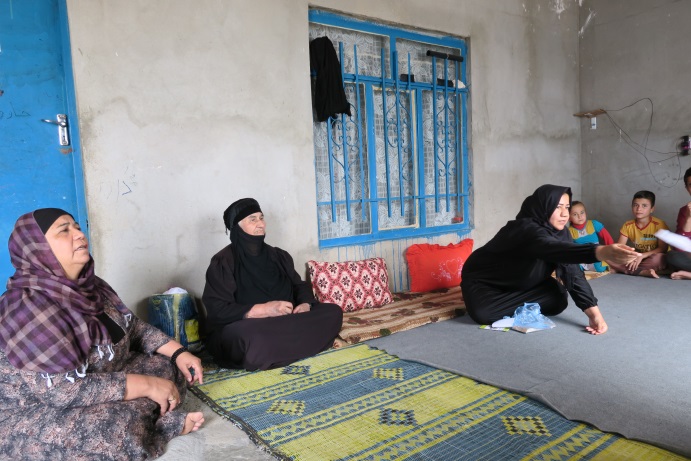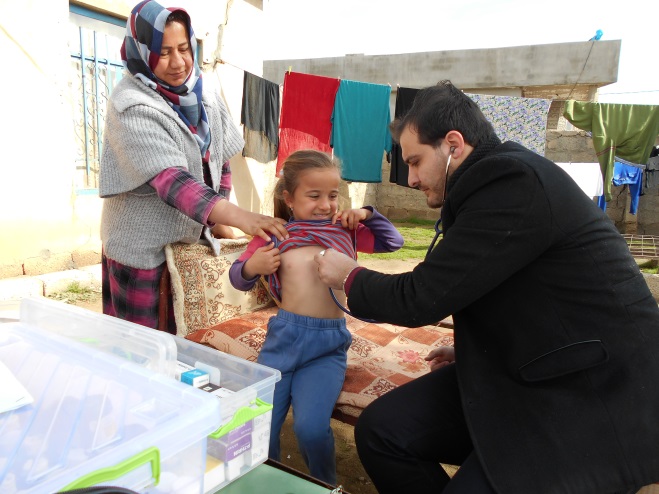Hands-on for Alia
Alia is a 38 old woman who lives in Bardasor. She lives with her sister’s family, the family of her brother and with her mother in the same house. Alia’s brother-in-law was killed in 2006 in Mosul, by one of the groups that later converged to what we now know as ISIS. They fled to a small village on the Ninewa plains. In 2014, the family had to flee again when ISIS conquered large areas, including their village. Since then, they live in Baradasor. Alia’s brother-in-law is the only adult man in their household and he is the breadwinner for the three families and their mother. The youngest son of her sister decided to quit school and now makes money for the families as well. They are bereft of their possessions, and depending on one and a half income for three families. This makes them highly vulnerable.

Due to the huge influx of refugees medicines are almost permanently unavailable
When Dorcas came for the first time to Bardasor, the village was very glad with this. The closest health center is in the next town, 5 km away. Although this distance is acceptable, the health center, like many others in the Kurdish Region of Iraq (KRI) lacks the capacity to deal with the huge influx of refugees and Internally displace persons (IDPs). The medicines are almost permanently unavailable and the doctors aren’t able to see all their patients. Dorcas was the first, and remains the only organization that visits this village and to bring medical services on a regular basis. In addition to this, Alia suffers from the Carpal Tunnel Syndrome (CTS). This means that the nerves to her hands are trapped, leading to pain in her fingers, especially during the night. It alsoseverely decreases her gripping power. Therefore, she is unable to do ordinary things such as doing the laundry or even carry things. She also has severe complications of diabetes,[1] that are probably the result of the medicines she got from a doctor in the hospital. One of these complications is tiredness. She says that she lacks the energy to undertake many things, because her body can’t use the energy she gets from the food she eats. Although less known, diabetes can also lead to major eye complications.[2] Alia’s eyes are often infected and produce a lot of moisture, occasionally she even bleeds from her eyes and her sight is strongly hampered on these occasions. Her ailments are fairly harmless when adequate medical services are in place, but – as her example shows – can cause severe suffering and hamper someone’s functioning when medical services aren’t there.

Alia dreams of getting a normal life and being able to take care of herself
For Alia, the mobile clinics brought immediate relief for her eyes. She got eye drops and was registered by Dorcas as a chronical patient. The eye drops reduced the suffering in her eyes and because she is a chronical patient, the doctor gave her enough medicine to cover the period until the next visit by Dorcas’ mobile clinic. However, although the eye drops brought relief, her main problem the CTS remained untreated. Alia remained a vulnerable patient with medical needs.
The only solution for her was a double surgery that ‘frees’ the carpal nerve and of course she and her family lacked the resources to pay for this operation. Through the referral program, Dorcas could help to pay for the surgery of her left hand and she was operated on the 6th of March. After a while her right hand can be operated as well. She won’t need the medicines, that fight her CTS and cause her diabetes complications, anymore. Although the effects of the operation are not visible yet, she dreams of getting a normal life and being able to take care of herself and helping her sister and her sister-in-law with running their three family household. This one time intervention has changed her life, increased her independence and restored her dignity.
[1] People with diabetes have an increased chance of CTS. However, some drugs against CTS (Corticosteroids) increase symptoms of diabetes. Dorcas didn’t give her these, but it might be possible that she got them from other doctors.
[2] When untreated, diabetes can even lead to blindness and is even the number one cause of blindness in Europe.
11 June 2019